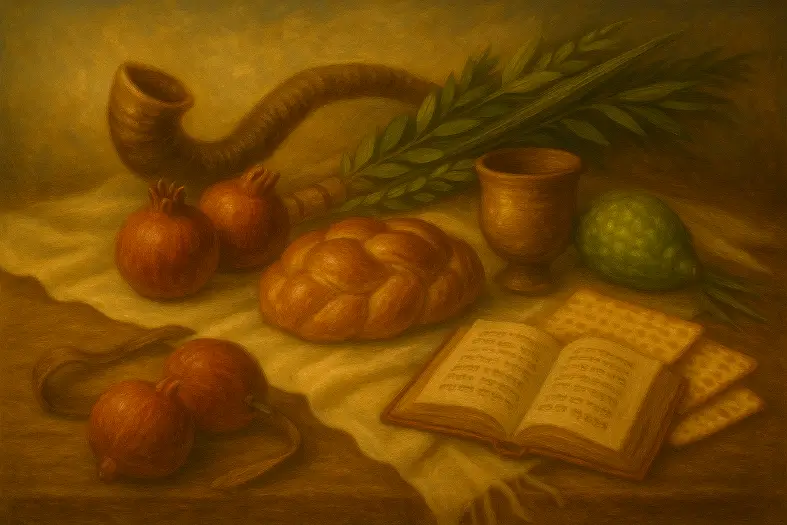


Take the Four Species during the seven days of Sukkot.
This mitzvah commands us to take the Four Species — the lulav (palm branch), etrog (citron), hadasim (myrtle branches), and aravot (willow branches) — during Sukkot. Waving them together symbolizes unity among the Jewish people, as each species represents a different type of Jew, yet all are bound together in serving Hashem. The mitzvah also expresses joy and gratitude for the harvest and divine blessings. Through this practice, we rejoice before Hashem and strengthen our awareness of His presence in our lives.
Commentary & Classical Explanation:


Mitzvot related to the Jewish festivals — their observance, rituals, prohibitions, and spiritual significance. This includes Torah-commanded holidays like Pesach, Shavuot, and Sukkot, as well as rabbinic celebrations such as Purim and Chanukah.
Represents Emunah—the deep, inner trust in Hashem’s presence, oneness, and constant involvement in our lives. This badge symbolizes a heartfelt connection to G-d, rooted in belief even when we cannot see. It is the emotional and spiritual core of many mitzvot.
Represents the concept of spiritual intentionality, purity, and sanctity—set apart for a higher purpose.
Mitzvot that strengthen communal life — showing up, participating, supporting, and belonging. Community is where holiness is shared, prayers are multiplied, and responsibility becomes collective.
Signifies awe and reverence toward Hashem—living with awareness of His greatness and presence.
Mitzvot that define and deepen the relationship between a person and their Creator. These include commandments involving belief, prayer, Shabbat, festivals, sacrifices, and personal holiness — expressions of devotion rooted in divine connection.

Dive into mitzvos, prayer, and Torah study—each section curated to help you learn, reflect, and live with intention. New insights are added regularly, creating an evolving space for spiritual growth.

Explore the 613 mitzvos and uncover the meaning behind each one. Discover practical ways to integrate them into your daily life with insights, sources, and guided reflection.

Learn the structure, depth, and spiritual intent behind Jewish prayer. Dive into morning blessings, Shema, Amidah, and more—with tools to enrich your daily connection.

Each week’s parsha offers timeless wisdom and modern relevance. Explore summaries, key themes, and mitzvah connections to deepen your understanding of the Torah cycle.